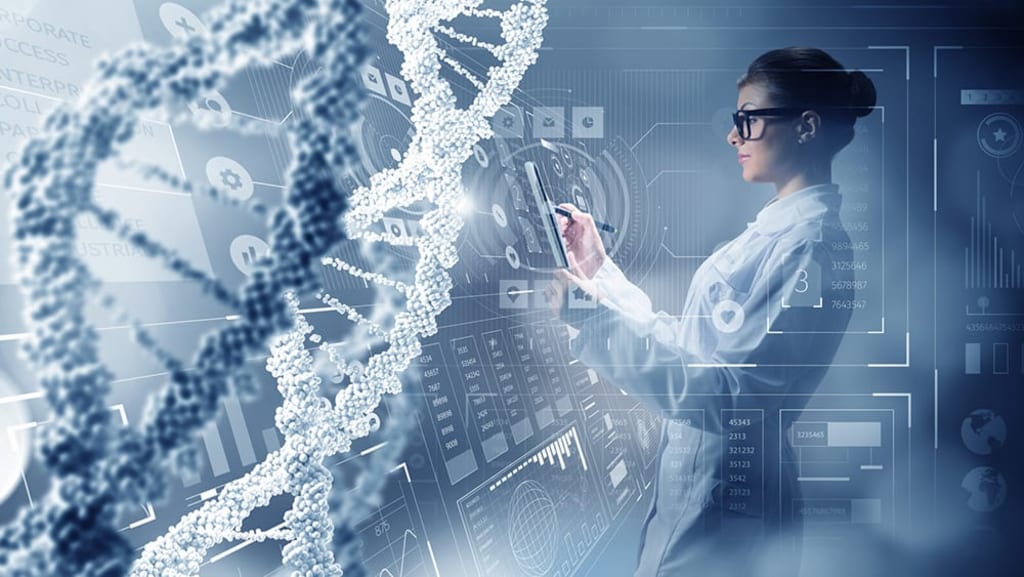How AI is Transforming the Healthcare Industry
Artificial Intelligence (AI) has emerged as a groundbreaking technology that is revolutionizing numerous industries, and healthcare is no exception.

Artificial Intelligence (AI) has emerged as a groundbreaking technology that is revolutionizing numerous industries, and healthcare is no exception. With its ability to analyze vast amounts of data, identify patterns, and make intelligent predictions, AI is transforming the healthcare landscape in remarkable ways. In this article, we will explore the various applications of AI in healthcare and its potential to improve patient care, diagnostics, research, and overall operational efficiency.
1.Enhanced Medical Imaging
Medical imaging plays a crucial role in diagnosing and treating various diseases. AI-powered algorithms can analyze medical images, such as X-rays, CT scans, and MRIs, with remarkable accuracy and efficiency. AI algorithms can detect early signs of diseases, such as cancerous tumors or anomalies in organs, enabling healthcare professionals to provide timely interventions. Additionally, AI can help radiologists by highlighting areas of interest and reducing the chances of human error, leading to faster and more accurate diagnoses.
2.Predictive Analytics and Early Disease Detection
AI algorithms excel in analyzing complex patient data, including medical records, genetic information, and lifestyle factors. By leveraging machine learning techniques, AI can identify patterns and generate insights that help predict the risk of developing certain diseases. This capability enables healthcare providers to intervene early and provide preventive care, potentially saving lives and reducing healthcare costs. Moreover, AI algorithms can continuously monitor patients' health metrics and detect subtle changes, alerting healthcare professionals to potential issues before they escalate.
3.Personalized Treatment and Precision Medicine
AI's ability to analyze vast amounts of patient data allows for personalized treatment plans based on individual characteristics and medical history. By considering factors like genetics, demographics, lifestyle choices, and treatment response data from similar patients, AI algorithms can suggest tailored treatment options. This approach, known as precision medicine, increases the likelihood of successful outcomes, reduces adverse reactions to medications, and optimizes patient care by considering each person's unique circumstances.
4.Chatbots and Virtual Assistants
Chatbots and virtual assistants powered by AI are transforming the patient experience by providing round-the-clock support and guidance. These intelligent systems can answer patient queries, provide basic medical information, schedule appointments, and offer personalized health advice. Chatbots also help alleviate the burden on healthcare providers by addressing routine inquiries, allowing them to focus on more complex patient cases. Additionally, virtual assistants can monitor patients remotely, providing real-time feedback and support, especially for those with chronic conditions or during post-operative care.
5.Streamlining Administrative Tasks
The healthcare industry is notorious for its extensive administrative tasks, which can consume valuable time and resources. AI is stepping in to automate and streamline these processes, freeing up healthcare professionals to focus on patient care. AI-powered systems can handle tasks like appointment scheduling, billing, and medical coding, reducing errors and improving overall operational efficiency. By automating administrative workflows, AI enables healthcare organizations to optimize resources, reduce costs, and enhance patient satisfaction.
6.Drug Discovery and Development
Developing new drugs is a complex and time-consuming process. AI is transforming this arena by analyzing vast amounts of medical literature, research papers, and clinical trial data to identify potential drug candidates and predict their efficacy. Machine learning algorithms can accelerate the drug discovery process by reducing the time and cost associated with preclinical research. AI can also facilitate repurposing existing drugs for new indications, offering opportunities for faster treatments for previously untreatable conditions.
7.Remote Patient Monitoring
AI-powered devices and wearables are enabling remote patient monitoring, revolutionizing the management of chronic diseases and post-operative care. These devices can track vital signs, activity levels, sleep patterns, and medication adherence. The collected data is then analyzed by AI algorithms, which can identify anomalies and alert healthcare providers in real-time. Remote patient monitoring not only improves patient outcomes but also reduces hospital readmissions and healthcare costs by enabling early intervention and proactive care management.
8.Ethical Considerations and Challenges
While AI brings immense potential to healthcare, it also raises ethical considerations and challenges. Privacy concerns, data security, and algorithm biases are critical issues that need to be addressed. Striking the right balance between leveraging AI capabilities and protecting patient privacy and confidentiality is paramount. Additionally, ensuring the transparency and fairness of AI algorithms is crucial to prevent biases and disparities in healthcare outcomes.
9.Data analysis for research and clinical trials
AI plays a crucial role in the analysis of vast amounts of data in research and clinical trials. Traditional data analysis methods can be time-consuming and limited in their ability to identify complex patterns and relationships. AI algorithms, on the other hand, can process and analyze large datasets quickly and efficiently, extracting valuable insights that can inform research studies and clinical trials.
10.Decision support systems
AI-powered decision support systems assist healthcare professionals in making evidence-based decisions by providing insights, recommendations, and treatment guidelines. These systems leverage AI algorithms to analyze patient data, medical literature, and best practices to offer valuable support to healthcare providers.
Artificial Intelligence is reshaping the healthcare industry, empowering healthcare providers and transforming patient care. From enhanced medical imaging and early disease detection to personalized treatment plans and streamlining administrative tasks, AI is driving improvements in diagnostics, treatment, and operational efficiency. As AI continues to evolve, addressing ethical considerations and challenges will be essential to harness its full potential. By embracing AI, the healthcare industry can deliver more accurate diagnoses, personalized treatments, and better patient outcomes, ultimately paving the way for a healthier future.
About the Creator
Aditya Bali
Discover a treasure trove of insights on tech, personality development, health, and more! Upgrade your life with practical tips and cutting-edge knowledge in one captivating blog. Don't miss out! #knowledge #growth #inspiration






Comments
There are no comments for this story
Be the first to respond and start the conversation.